Portugal struggles under weight of austerity
- Published
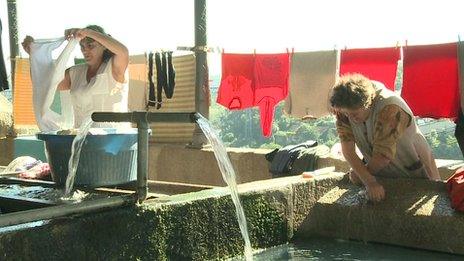
Many families wash clothes by hand in free spring water in the city
Half a dozen women are working outdoors at an ancient stone sink set high above a river.
They are doing their family's washing - rubbing and rinsing in cold water gushing from a galvanised pipe fed by a cliff-top spring. This might not be a remarkable sight in many parts of the world. But we are in the EU - in the centre of the second largest city in Portugal and the regional capital, Porto.
Yet for those with unpaid electricity bills or for jobless families who can't afford to replace a broken washing machine, this free medieval equivalent of a launderette is the only place they can afford to use.
Just across the water, there is one sign of Porto's export success. The clue is in the city's very name - it's famous for producing port wine. Every night, backlit advertising signs on a string of historic wine lodges twinkle on the Douro river below.
From the southern side (officially it is Vila Nova de Gaia), you have the choice of six bridges to take you into Porto - a steep-sided patchwork of medieval and baroque architecture. But the reality is that many hundreds of the city's buildings are close to falling down.
Walking round the centre, you find not just empty shops but whole blocks of abandoned property. Porto is fast becoming a kind of European Detroit or mini-Havana. Many say the place has always exuded an indefinable air of melancholy. But today every street corner is a monument to the economic crisis.
Harsh reality
But hardship can breed innovation - and there is an alternative for visitors bored with official tourist tours that gloss over the everyday realities.
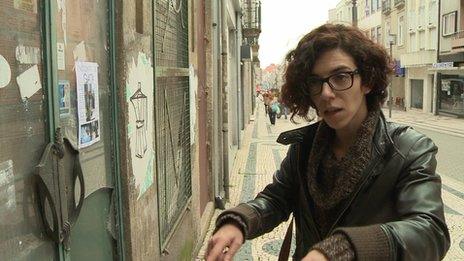
Out-of-work architect Gui Castro Felga says austerity is hurting society deeply
Some young out-of-work architects who refuse to leave the city or join the Portuguese brain-drain have opened an unlikely walking-tours agency they call The Worst Tours. Follow them for a couple of hours and you soon get lost up back alleys, past cheap taverns and through mean streets to old markets with crumbling masonry.
The walks show the real impact of the bailout measures in sharp relief. Tax rises and welfare cuts have changed lifestyles and accelerated the neglect of the physical environment. Rival tours may focus on the historical highlights, but the truth is there are now far more lowlights - an estimated 2,000 businesses have closed in the city over the past two years alone.
These tours are also unashamedly partisan. Above all, tour guide Gui Castro Felga says, she wants people to understand that austerity measures are not theoretical - they are something you can touch and feel as you walk around the country's second city.
"The cuts that were supposed to make Portugal more competitive with places outside, but they are causing a downward spiral," she says.
"People have less money and the result is that stores and local businesses close. It's hurting society deeply in practical terms."
Struggling businesses
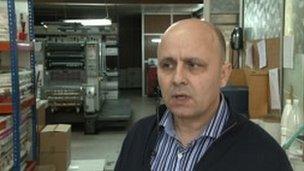
Mario Jorge Gomes has cut his workforce since austerity measures came in to force
One surviving, second-generation family business is printers Molografica. It once kept 40 staff busy, but is now trying to keep 11 employed. Its rambling city centre offices house impressive digital machines that can process and print anything from full colour books to top quality brochures and tickets.
But what Molografica needs is longer print runs, that will probably come only from customers who export goods or services outside Portugal. Inquiries in Porto may be up a little, but boss Mario Jorge Gomes says orders from industry customers are often much smaller than they used to be.
He says: "I just had an inquiry for a thousand labels for clothing from an old customer. At one time it would be for 1,200 labels. So you see that I can't create more jobs like the government wants us to. What I am waiting for is more orders."
So if jobs are continuing to disappear from cities like Porto, then what will the jobless do - or at least where will they go?
International labour organisation figures compiled in Lisbon show more lower income families heading for the coast.
One such emigre is fisherman Augusto Braga, returning to the nearby port of Matosinhos - about 7km (four miles) north of Porto. This wasn't in his career plan. Made redundant from his job in security, he's returned to the traditional occupation of his family to make ends meet.
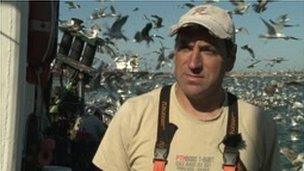
Augusto Braga has returned to his family's fishing business after losing his job in security
"I took the job because they stopped paying my salary and I was made redundant," he says.
"There were only small jobs on the land - not enough to live on. I like to be on the sea so it was the only choice."
Family ties count here - the fishing cooperative is almost an extended family. It's also one that seems to tolerate cash-strapped locals who swarm round as the boats are unloaded - competing with voracious seagulls for a few dropped fish to sell or eat for lunch.
One financial sign of the times is that, after years of decline, tinned sardines are making a comeback and more are going for processing. Not so long ago, Portugal's canneries looked outmoded. Yet now fresh fish is too expensive a treat for many, there's a ready market for cheap, yet high-quality, protein.
New life
The nearby Minerva factory of the family firm A Poveira cooks fish fresh from the local seas in the morning and its army of mainly women workers pack and can it in the afternoon.
It's one of just seven surviving fish canneries in northern Portugal. New investors have put in 5m euros ($6.7m; £4.2m), not just preserving the company but breathing new life into it. Fancier new varieties are boosting export orders and saving jobs in a region that badly needs more of both.
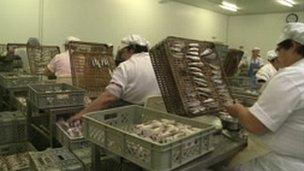
Canneries are benefiting from increased demand for tinned fish
One of the the longest serving workers is Rosa Macaes. As she speaks, she deftly tailors the sardines with scissors so they fit exactly the tins, nose to tail.
"Times are more difficult and we all have to work longer than ever before," she says.
"Everything is more expensive and it's more difficult to help my children and their families than in the past. It's very important to be in a job and I know many people who don't have one. But I believe the jobs are out there - they are hard and younger people just don't want to do them."
Many might take issue with that in a country where unemployment is falling, but remains at nearly 16%. But as a visit to the country's second city so graphically illustrates, the road to economic recovery is long and the city of Porto and its people bear the scars.
- Published7 November 2013
- Published3 October 2013